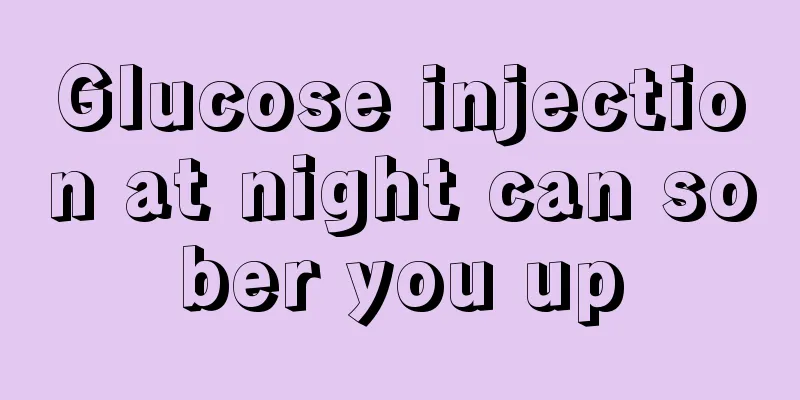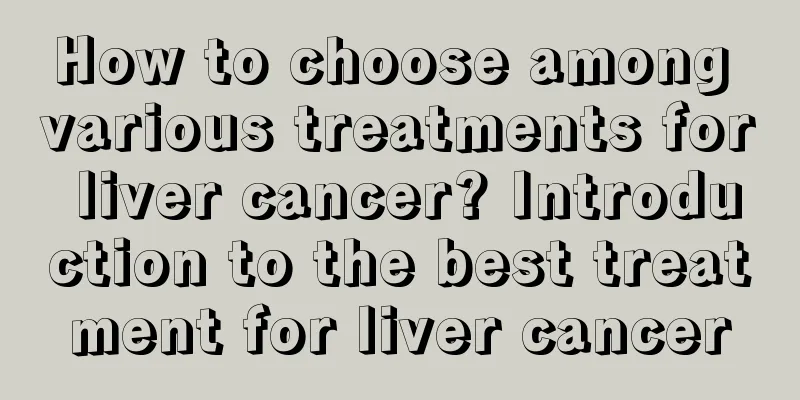Glucose injection at night can sober you up

|
Glucose is a widely used drug, and the main role of glucose in the human body is to promote metabolism. Glucose can also effectively replenish the energy that the human body lacks. When a person loses physical strength too quickly, glucose can be injected appropriately. After a person has symptoms of drunkenness, he should quickly use hangover methods to sober up. Can glucose injection help sober up? In addition to providing energy to the body, what effects does glucose infusion have on ethanol metabolism? When it comes to drinking, the vast majority of Chinese people, regardless of gender, age or status, have had personal experience. As a medium of communication, a bottle of good wine is an indispensable item in occasions such as welcoming guests, seeing off guests, and gathering with friends. From ancient times to the present, "wine culture" has always played an important role in the development of Chinese social etiquette culture. As the saying goes, "Deep feelings, one gulp of drinking", after a hearty drink, many people find that they regret it and think of the legendary hangover remedy: glucose, because they heard that going to the hospital to sober up seems to just involve a glucose transfusion for a while. So can glucose really help to sober up? Then why is glucose the first choice when giving infusion to drunk people? Glucose and ethanol Glucose is one of the main energy sources for the human body. After glucose enters the blood, it is transported to various tissue cells for synthesis and decomposition to provide energy for the body. The main function of glucose is to oxidize and decompose it in various tissues to provide energy. After drinking, the ethanol in the wine is completely absorbed by the stomach and small intestine within 0.5 to 3 hours and distributed in all water-containing tissues and body fluids throughout the body. Although ethanol is widely distributed in the body, 90% of it is broken down and metabolized in the liver. Too high ethanol concentration in the blood will not only cause some symptoms and complications of drunkenness, but also ethanol requires a lot of energy in the metabolism process, and its energy source depends on the supply of glucose. So, in addition to providing energy for the body, what effect does glucose infusion have on ethanol metabolism? Accelerate ethanol excretion After glucose infusion, blood sugar rises, blood volume increases, and the excretion of fluid in the body through urine through the kidneys is accelerated. Therefore, infusing glucose after being drunk can accelerate the excretion of ethanol through urination and alleviate the state of drunkenness. Accelerate the decomposition of ethanol After drinking, the liver needs a lot of energy to metabolize alcohol. Providing glucose can speed up the metabolism of alcohol. Some people believe that glucose infusion has a liver-protecting effect, but there is insufficient evidence to confirm this. Correction of hypoglycemia The process of ethanol metabolism is accompanied by complex changes such as changes in the NADH/NAD ratio, decreased galactose tolerance, increased triglyceride synthesis, and increased lipid peroxidation, so hypoglycemia will occur after drinking. Hypoglycemia usually occurs 6 to 24 hours after moderate or heavy drinking, but it can also occur soon after drinking. The blood glucose concentration is generally <1.7 mmol/L. Therefore, glucose infusion is a direct and effective method to correct the hypoglycemic state after drinking. Infusion method Light to moderate drinkers without impaired consciousness can be infused with 500 mL of 5% glucose saline while receiving oxygen, warming, and ECG monitoring. 50 to 100 mg each of vitamin B1 and vitamin B6 can be added to the saline. For patients with acute impaired consciousness, intravenous injection of 100 mL of 50% glucose and intramuscular injection of 100 mg each of vitamin B1 and vitamin B6 can be considered to accelerate the oxidation of ethanol in the body. For those who are restless or overly excited, small doses of diazepam can be used, and the use of morphine, chlorpromazine, and phenobarbital sedatives should be avoided. Don't expect too much Glucose itself cannot help break down alcohol, but it can provide the necessary energy support for alcohol metabolism. Most hangover medicines or secret recipes cannot replace the body's ability to "digest" alcohol. Some of them can only slightly relieve the nausea, vomiting, and acid reflux after drinking, or have a calming effect. More often, they are a form of psychological comfort. |
<<: Oven baked sweet potato with cheese
Recommend
Scientific explanation of sleep paralysis
Many people may have encountered the phenomenon o...
What foods can you eat to stay away from liver cancer? The seven main culprits of liver cancer
On October 23, at 5:30 pm, Da and Xiao S's fa...
The stool shape becomes flatter and thinner
There are many reasons why the stool becomes flat...
How to effectively care for fibroids
How to effectively care for fibroids? People'...
Treatment options for esophageal cancer
Treatment options for esophageal cancer include: ...
Can I eat lettuce if I have skin allergies
Lettuce is bitter herb. Some people ask what bitt...
What should I do if hair grows on a mole
The growth of hair on the top is actually caused ...
Why do gliomas keep recurring
Everyone is familiar with the disease of glioma. ...
One-sided chin high
In life, many people's faces do not look part...
Which hospital is good at treating brain cancer
There are many types of malignant tumors around u...
Early renal failure with high blood pressure
Hypertension is a common disease that mostly occu...
What are the requirements for moving into a new house?
When moving to a new home, people will be very ha...
What to do if you gain weight from staying up late
Staying up late and gaining weight makes many peo...
What is the diagnosis method for laryngeal cancer
Laryngeal cancer is a type of cancer, so it is in...
What are the effects and functions of cuttlefish shell
Cuttlefish are famous because, if they encounter ...









